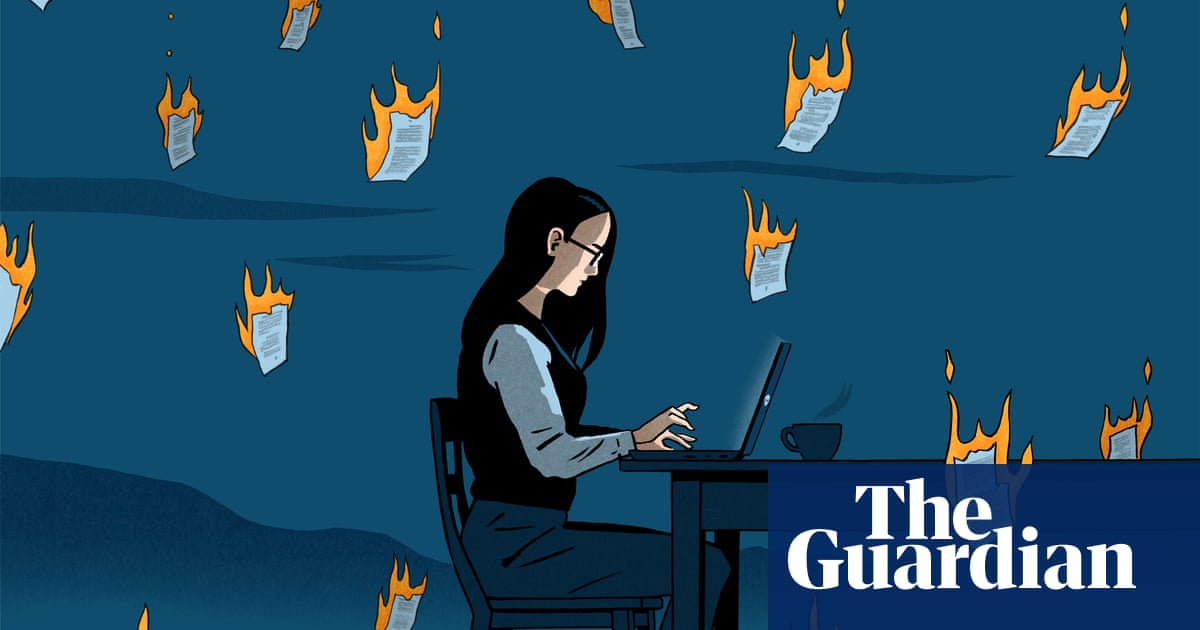
Which films kept you entertained over the holidays? Was it Silent Night, the sweary festive Britcom starring Keira Knightley? The courtroom drama Naked Singularity, with John Boyega as a crusading lawyer? Or did you watch Leonardo DiCaprio as a dorky astronomer in Don’t Look Up, a slapstick political satire? Whichever it was, I hope you poured yourself a large one, because none of those films are quite as light as they seem. All take place in the shadow of imminent Armageddon.
That’s right: the end of the world is nigh, and it’s no longer the preserve of megabudget disaster movies or bleak survivalist thrillers. These days the looming obliteration of our species can just as readily form the backdrop to some governmental mockery or a boozy country-house drama.
Why the sudden change? After all, existential catastrophe is hardly a new subject for Hollywood, which has been churning out such tales for the best part of a century. Historically, though, they have largely come in the form of razzle-dazzle showstoppers, be it during the original disaster-movie boom, with titles like When Worlds Collide, or more recent CGI-fuelled fare such as The Day After Tomorrow. The more muted end-times films have been generally been left to less popcorn-hungry countries like Russia (The Sacrifice), France (Time of the Wolf, Delicatessen) and Canada (Last Night).
But the mainstream movie industry has nonetheless made sure that even the most casual filmgoer will be well used to witnessing humanity’s spectacular destruction. We’ve seen it carried out by deranged scientists and comic-book villains, by robot uprising and cosmic collision, by viral outbreak and biblical flood, by dragons, birds and talking monkeys. And unsurprisingly, a genre predicated on the ultimate worst-case scenario has tended to reflect the anxieties of the time. Invasion of the Body Snatchers offered an allegory for McCarthyism; Steven Spielberg’s War of the Worlds, with its nightmarish urban devastation, was the first truly post-9/11 blockbuster; Wall-E sounded the alarm about mass consumerism. The genre itself initially mushroomed during the cold war, when “mutually assured destruction” became a household phrase.
Now it’s exploding again. According to the Wikipedia page listing “apocalyptic films”, there were more additions to the genre in the past decade than the previous two combined. In the last year alone the destruction of our planet has been either realised or threatened in sci-fi extravaganzas, family tearjerkers and chirpy animated romps. This year will bring more of the same: slated for TV are two cheerless visions of post-viral dystopia, The Last of Us and Station Eleven, as well as the Ronseal-titled Extinction. At the cinema, we’ll get the big-screen pageantry of Moonfall from disaster impresario Roland Emmerich, and a Noah Baumbach adaptation of Don DeLillo’s eco-fiasco novel White Noise.
But before all that, treat yourself to the best film of the festive season: The Humans, an understated chamber piece in which a dysfunctional family gather for Thanksgiving under a distinct atmosphere of – you guessed it! – creeping existential dread. The real drama, though, lies in the bickering of rival siblings, senile grandparents and sozzled patriarchs. It’s more evidence that end-times anxiety can now be treated as mundane, off-screen, secondary to the domestic fallout: call it kitchen-sink nihilism.
It’s a long way from the cigar-chomping triumphalism of Armageddon and Independence Day – both certified artefacts of Clinton-era America – but maybe this trend for quietly apocalypse-adjacent storytelling is to be expected in an era when the real-world headlines tell of survival bunkers, fire tornadoes and doomsday glaciers. Dr Strangelove’s breakneck bomb-ride was the response to a world where nuclear decimation could arrive at any moment; maybe this new mode of restraint reflects a reality where the unthinkable seems to be unfolding bit by bit, a matter of glum inevitability. Adam McKay’s climate-change satire Don’t Look Up takes its lead from Kubrick’s movie, invoking the apocalypse as an act of ridicule towards a complacent political class. But six decades on, the tone has shifted from anarchic glee to resigned exasperation. “Maybe the destruction of the entire planet isn’t supposed to be fun,” says Jennifer Lawrence’s scientist. “Maybe it’s supposed to be unsettling.”
It’s a credo that unites this current crop of films, which all provoke angst rather than excitement, defeatism rather than hope. This is the way the world ends: not with a bang, but a shrug. Or as Arnold Schwarzenegger grumbles in End of Days, while the scenario of the title closes in: “We have some real serious problems here – and we’re not solving any of them!” And when it comes to the annihilation of humankind, there’s a man who knows what he’s talking about.












